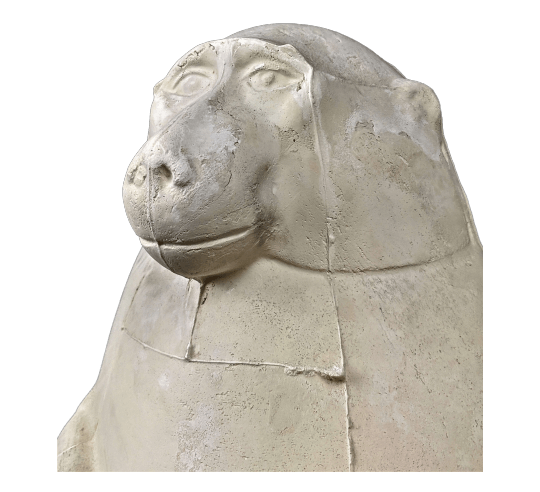- New
Statue of the Egyptian god Thoth represented as a baboon or Papio cynocephalus, Louvre museum
Statue of the Egyptian god Thoth represented as a baboon or Papio cynocephalus, Louvre museum.
Handmade reproduction entirely made and patinated by hand.
Thoth (or Thoth or Tot or Tehut or Theut) is his name in Greek: Θωθ , in Egyptian he was called Djehouti (or Thehuti or Djehouty or Dyehuty or Jehuti or Tahuti or Zehuti or Techu or Tetu), which is translated by "that of Djehut", and in Coptic : Thōout. He also received the nicknames of "Master of flood and water regulation", the "Bull of the stars" to represent the mental faculties of Ra, and "Silver of Aten" in the Late Period (656-332). He was the God of writing, knowledge and sciences, of the creative word, mathematics, geometry and all measures. Everything that man has knowledge comes to him from Thoth.
He is considered the scribe of the Gods. Through his knowledge of hieroglyphics, he was the protector of the scribes. Also the God of magic and magicians, of healing, he was also the lunar God of Hermopolis Magma (or Khemenou or Kemnou or Khmoun or Ounou), in Upper Egypt, where in time he became the God of wisdom. In the afterlife, Thoth would bring the deceased into the judgment hall and lead him to Osiris.
Characteristics of the statue of the Egyptian god Thoth represented as a baboon or Papio cynocephalus:
- Height: 47 cm.
- Material: white plaster.
- Other available materials: resin, reconstituted stone.
- Available patinas: bronze, terracotta, marble, wood, polychrome, gilded, stone, or diorite. Contact us for prices of our patinas (variable according to the desired color).
Delivery time: Delivery within 15 to 25 days.
Artisanal reproduction entirely handcrafted and patinated.
In stock.
If Thoth's greatest quality was to have been intelligent, his greatest virtue was undoubtedly to have always been wise and competent. His very ancient origin goes back to the story that gave birth to him from the skull of Set. However, Thoth curiously presents none of the bad sides of the terrible God. Thoth does not manipulate for his own profit and works on the contrary unceasingly for the permanence of the world wanted by Re.
The Greeks assimilated him to Hermes because of his attributes and similar functions, and the Romans to Mercury. One of the titles of Thoth "Three times great" has been translated into Greek: τρισμεγιστος (Trismegistus), referring to Hermes Trismegistus.
The legends depicting Thoth associate him with knowledge and more generally with the organization of the celestial and terrestrial world. His intelligence and pragmatism served as a model for Pharaonic Egypt and its highly organized administration, so Thoth was a model God for mortals.
By the Verb, Thoth created the world. Thus the Hermopolitan cosmogony depicts the origin of the world. A world that was certainly created, but still had to be organised. Intelligence lay in Thoth's heart. It is to her, helped by Sia, personification of knowledge, that mortals owe the world as it is. To speak, calculate, write, to create was a gigantic work, Thoth then invented language for this purpose. Through the Verb made intelligible, the world was built according to the desires of this God. The great universal mechanics of the celestial bodies began to work.
However, without the justice of Maat, who sits with the Gods, but also in the hearts of men, the world would be nothing. Therefore Thoth is also "he who writes Maat". In all points, knowledge, organization, justice, Thoth is a true model for men, starting with the King or Pharaoh and his administration.
Thoth enjoys the highest esteem among the other Gods. Not content to sit in the divine courts, he is the clerk of them, who approves and records the verdicts. He is the Keeper of the Seals. Thoth does not fail to intervene often in the quarrels between the Gods. The active part he plays in the settlement of the conflict between the two long-time enemies, Set and Horus, earned him much respect. As a skillful referee, he was "the one who managed to separate the two combatants". A feat that one admires when one knows how much hatred Set had against his nephew.
A text of Edfu relates his birth:
"In the midst of the primordial ocean appeared the emerged land... On it, the Eight came into existence. They made appear a lotus from which Re, assimilated to Shu, came out. Then came a lotus bud from which emerged a dwarf, a necessary feminine auxiliary, whom Ra saw and desired. From their union was born Thoth who created the world through the Word".



















